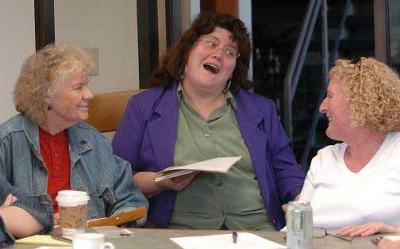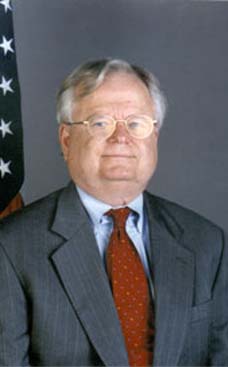
She studied journalism, earned three degrees at the University of Maine and spent two years in the Peace Corps, which at first resisted giving her the Africa assignment she wanted because of her deafness. Laubenstein went deaf slowly but completely. One day in college she stepped into the shower and couldn't hear the water. She had been expecting it. When she was in second grade, she was diagnosed with a hearing loss. When she was in fourth grade, she got her first hearing aids. When she was 12, a doctor advised her parents to sterilize her so she wouldn't pass on her disorder. She had learned how to live with deafness. Before she went deaf, she learned to talk, write and lip-read. She became a computer whiz before there was an Internet, joining bulletin boards that allowed her to communicate with people all over the world. She didn't learn to sign until she was in her mid-20s. All of that made her a bit of an oddity. The deaf world called her hard of hearing. The hearing world called her deaf.
Benin RPCV Karen Laubenstein has hearing restored with bionic ears
After years of deafness, making sense of a new sense
Bionic ears offer a gift of her family's voices
By BETH BRAGG
bbragg@adn.com
Published: September 23, 2007
Last Modified: September 23, 2007 at 03:30 AM
Caption: Karen Laubenstein, center, can now hear what's said in meetings, such as this one recently with Julia Garrigues, left, and writer Dana Stabenow. The three are on the steering committee for Bouchercon 2007.
Karen Laubenstein has been married for almost 13 years and was flabbergasted this summer to discover her husband has a Texas accent.
She turned to pudding when her 6-year-old son told her something she'd never heard before: "I love you, Mom."
She jumped in fright when she opened a greeting card and the "YMCA" song started to play.
Just wait till the day when she's filling the tank of the family truck and the pump tells her she can get a liter of Pepsi for a buck-fifty.
So much to make sense of, now that she has all her senses.
Laubenstein, 49, can hear again after nearly 30 years of deafness.
In June, after years of ambivalence, she had cochlear implant surgery in both ears. The biggest miracle workers since Annie Sullivan, bionic ears are hailed as the only medical devices capable of restoring any of the five senses.
For Laubenstein, an editor and writer for the Bureau of Land Management in Anchorage, they've worked wonders she never imagined.
"I was perfectly happy being deaf, I really was," she said. "I was shocked to find that it is different to hear, that I do need it. It's just unbelievable how much has changed in a few months."
Laubenstein for years didn't think she was missing much because her ears didn't work. She can talk, she can read lips, and she's a world-class e-mailer who was communicating online with people all over the world even before there was a World Wide Web.
But then her son Jamie started getting older, and Laubenstein thought about never hearing the sound of his voice.
Today, it's like she's Dorothy opening the door after the house has landed in Oz. After a lifetime of black and white, suddenly everything's in color.
Really loud colors.
ASSAULTED BY SOUND
When you are able to hear after 30 years of silence, life becomes one big Spinal Tap concert. Everything sounds like it's been turned up to 11.
The lawn mower is so loud, Laubenstein equates it to standing next to a helicopter as it takes flight. Her keyboard sounds like a freight train. The buzz of the dryer, the bark of the dog, the snarls of the cats when they tangle with each other -- each is relentlessly loud.
The expensive batteries that operate bionic ears run out of juice after about 12 hours. When that happens, usually just an hour or two after she gets home from work, Laubenstein unplugs for the day. As much joy and astonishment as hearing brings, the respite is a relief.
In Laubenstein's world, there's a fine line between a symphony and a cacophony.
"I'm cringing at sounds like the toilet flushing or loud laughter," she said.
And it's not just sound that assaults her. Metal objects do too. When you have powerful magnets implanted in your skull, life can get a bit sticky.
The week after Laubenstein got bionic ears, she attended a meeting in a room with one of those wipe-on/wipe-off bulletin boards.
"I stuck to it," she said. "And nobody helped me get my head off, they were so stunned."
The external ear pieces she wears tucked behind her ears are also powerfully magnetic. She's learned to slip them on only after she gets dressed, because otherwise anything metal -- a zipper, a snap, an earring -- sticks to them.
Just the other day, one of the ear pieces went missing. Her husband found it stuck to the refrigerator.
A FAMILY TRADITION
Laubenstein went deaf slowly but completely.
One day in college she stepped into the shower and couldn't hear the water. She had been expecting it. When she was in second grade, she was diagnosed with a hearing loss. When she was in fourth grade, she got her first hearing aids. When she was 12, a doctor advised her parents to sterilize her so she wouldn't pass on her disorder.
Laubenstein's mother, Mildred Jackson of East Baldwin, Maine, was one of eight children to grow to adulthood, and one of four to develop nonsyndrome sensorineural hearing loss/deafness -- a genetic disorder so rare, the National Institutes of Health has studied the family since 1990.
Her mother, brother and a cousin all have cochlear implants. Her two sisters wear hearing aids. Her 6-year-old son Jamie can hear just fine but has a 50-50 chance of losing some or all of his hearing someday. He learned how to sign about the same time he learned how to walk. Just in case.
Her mom received an experimental implant in 1992. The wound got infected. A few years later, she had a stroke. Laubenstein blamed the implant, which is one reason she delayed getting her own bionic ears.
There was another reason. The surgery destroys any residual hearing there may be. Though Laubenstein has not had what's called "voice recognition" for 30 years, she was able to hear some sounds -- like a barking dog -- with the help of hearing aids.
Besides, she had learned how to live with deafness. Before she went deaf, she learned to talk, write and lip-read. She became a computer whiz before there was an Internet, joining bulletin boards that allowed her to communicate with people all over the world. She didn't learn to sign until she was in her mid-20s.
All of that made her a bit of an oddity. The deaf world called her hard of hearing. The hearing world called her deaf.
A LUCKY BREAK
The words that best describe Laubenstein have nothing to do with hearing or deafness. She is vivacious, talented and ambitious. "I love people," she said.
She had two goals as a schoolgirl in Maine: to become a writer, and to show the world she could do anything a hearing person can do.
She started a high school newspaper and joined just about everything she could. She managed sports teams, got into theater, participated in foreign exchange programs. "I even joined concert band," she said. "They had me do the triangle."
She studied journalism, earned three degrees at the University of Maine and spent two years in the Peace Corps, which at first resisted giving her the Africa assignment she wanted because of her deafness.
She worked for five years in Washington, D.C., spending time as a public affairs specialist with the National Institutes of Health and as a congressional fellow for Sen. Ted Kennedy. In the early 1990s she took a writing and editing job with the BLM in Colorado, where she was the primary author for a textbook called "Discovering Archaeology in Alaska."
While working on the project, she became a regular on the "Alaska Mac" bulletin board, a precursor to e-mail. When she came here in the summer of 1994 to talk to educators and scientists about the book, she tacked on a week of vacation to spend with her computer friends.
One of them was Jim Lavrakas (a photographer for the Daily News), who took Laubenstein to his family's cabin in Seldovia. While hiking, she fell 35 feet off a cliff and broke her leg and ankle.
"So I got stuck here and Jim wrote about it on Alaska Mac, and all of these bachelors wanted to show me Alaska from my wheelchair," she said.
One of them was Ron Laubenstein, a graphic designer for Fish and Wildlife.
"I took her fishing in Seward," he said. "I wheeled her around, chartered a boat. We caught a lot of silvers and it took off from there."
Within a couple of weeks, Laubenstein called her boss in Colorado to say she was staying in Alaska and getting married.
COWSILLS AND CLASSICS
Ron has a list of everything that's different now that his wife can hear.
They don't have to be face to face when they talk. They went to their first movie together.
And if Laubenstein was surprised to learn her husband has a trace of a Texas drawl, he was surprised to learn he and his wife have completely opposite tastes in music. He likes rock 'n' roll. She likes classical.
The love of music that prompted a deaf teenager to join the high school band has been rekindled. One of the first things Laubenstein did after her surgery was download songs she remembered from when she was little. "The playlist on my iPod is very strange," she said. And how: It features the Cowsills.
Today, three months after surgery, Laubenstein works hard to process the 22 tones her bionic ears send to her brain. She can't separate extraneous noises from conversations. When she's in a group, her head swivels like a Bobblehead as she follows each voice and her face fills with intensity as she tries to make sense of everything.
Two weeks ago, for the first time since she was in grade school, Laubenstein called someone on a regular phone. "I had a hard time figuring out how to hang up," she said.
She still favors e-mail over phone calls. She isn't ready yet to turn on the radio or go to any more movies.
"I'm taking baby steps," she said.
After living in silence for more than 30 years, Laubenstein doesn't need to hurry her journey into the hearing world. And even when it is complete, she will never hear things the way most people do.
"I will never be completely hearing," Laubenstein said, "but oh boy, I have come a long, long, long way in that direction."
Find reporter Beth Bragg online at adn.com/contact/bbragg.



















